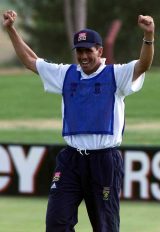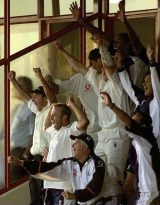
|

A delighted Nasser Hussain celebrates victory
© Getty Images
|
|
Hindsight is a wonderful thing. Once Hansie Cronje's involvement in match-fixing became public knowledge, events during the Centurion Test between South Africa and England in January 2000 were looked at in a new light. His last-day declaration and the offer he made to Nasser Hussain, England's captain, which resulted in England 's thrilling two-wicket win, were regarded with far more scepticism.
We now know that Cronje's offer was motivated by factors other than cricket. But at the time, his tactics were generally applauded.
The loss of the second, third and fourth days to rain meant that the Test was heading for a dull draw. South Africa, who had struggled to 155 for 6 on a curtailed first day, were expected to complete their innings and then have a crack at England. In terms of the series, however, it was immaterial as South Africa were already 2-0 up.
However, behind the scenes, before play resumed, Cronje bumped into Alec Stewart on the stairs and asked if Hussain would consider an offer, which Hussain said was 270 in 73 overs. "Fletch and I, both being conservative types, decided to see how things went in the first session," he said. Given that the pitch had been so bowler-friendly on the first day, neither was tempted. Stewart, too, felt this was not on: "This was not Essex v Hampshire during my youth." Michael Atherton, Hussain's predecessor, agreed. "All of us thought it would be madness to agree to a game without first seeing how the pitch would play after three days of rain, and we deferred."
When South Africa resumed it soon became clear that the track had lost many of its demons and Lance Klusener and Shaun Pollock scored with ease. They were helped somewhat by Darren Gough not being at his best. "Gough bowled a pile of shite," Hussain recalled. "I knew then that he'd had a few drinks the night before. It was stinking hot, so I decided to punish him by keeping on bowling him."
Forty minutes into the day, Hussain sent a message from the field to see if Cronje was still interested in a deal. "I deliberately aimed low at first and said, 'How about us chasing 250?'," he said. "Hansie just said, 'Fine'. I couldn't believe it. No haggling. No banter. No bartering, No mention of how many overs we would face. It was like that scene from Life of Brian when the salesman is all indignant because the guy has simply paid his first asking price without any argument."

|

Hansie Cronje loosens up before the match: 'We have a duty to entertain and get full houses'
© Getty Images
|
|
The proposal from Cronje was 245 in 76 overs - three overs more and 25 runs less than the original proposal. A four from Paul Adams off the last ball of the innings increased the target to 249.
Cronje claimed that he had talked about the declaration plan among his team-mates and admitted "there were mixed views when the deal was struck". Although it was subsequently claimed that no-one had backed the move, Pollock said in the immediate aftermath that "we had discussed it and we had put a proposal forward".
Cronje then met with Barry Jarman, the ICC match referee, to discuss the legality of forfeiting the innings - there was some ambiguity as the Laws only referred to the ability to forfeit a second innings - and in the end Jarman agreed that he was happy that the suggestion was within "the spirit of the game". England went on to win the game, an unexpected cliff-hanger in which the hungover Gough smacked the winning boundary with two wickets and five balls to spare.
"Most of us heard rumours of bookmakers and payments," one unnamed England player told The Mail On Sunday a few months later. "Most couldn't believe it but the stories just didn't go away." Michael Vaughan, who was named Man of the Match for his 69, said: "It's very disappointing to think I was involved in it, even though I had no inkling at the time about what was going on in the background."
Atherton described the victory as "the cheapest win of my Test career. For the first time in my life I felt completely flat at the moment of a Test victory. It wasn't that I suspected match-fixing, but a Test match victory is a thing that has to be earned."
He was also unhappy with the way the day had panned out: "The declaration was out of character. We lost a few wickets; at one stage, we virtually shut up shop when Stewie and Vaughnie were in. At that point, he [Cronje] brought on Pieter Strydom, an inexperienced bowler, and a couple of boundaries off him kept the game open. That was when I thought there was something going on. South Africa were trying to win the game, but it was clear that Cronje was after a result."
Most of the media praised the arrangement, although a number griped about the artificiality of it. In the Independent, however, Derek Pringle was more questioning of Cronje's behaviour. "Amazingly, given his reticence to attempt anything unusual, the South African captain agreed, even amending the target slightly in England's favour," he wrote. "For those used to watching his strangling tactics in operation, the deal was completely out of character and cynics felt it smacked of a captain under pressure making a late bid to show his adventurous side."
In the Scotsman, Roger Skidmore made a flippant observation that only money would have led to such a last-day deal - with regards to Cronje, that was far to closer to the truth that he ever knew. "A gentlemanly handshake while Hussain surreptitiously stuffed a brown paper envelope crammed full of 100 rand notes in Cronje's backpocket (note to lawyers ... only joking) would have sufficed."

|

The England side as Darren Gough hits the winning boundary
© Getty Images
|
|
In the post-match interviews, Cronje said that he had "heard a few whispers that some important people are unhappy about what I did today. If that's the case, I want to get out of the game. As Test cricketers we have a duty to entertain and get full houses and this was far better than seeing spectators sitting there with long faces."
On April 12, the match-fixing scandal broke, and Centurion came under the spotlight. Within three days, those suspicions had proved to be valid. Cronje, it emerged, had been contacted by a bookmaker on the fourth evening who was in danger of sustaining massive losses were the match to finish as a draw. He made Cronje an offer if he could produce a result.
"A bookmaker urged me to speak to Hussain about an early declaration," Cronje told the King Commission later that year. "He said if we declared he'd give $150,000 to charity." Nothing was agreed, but when he received Hussain's agreement on the final morning, he immediately texted the bookmaker advising him that "the game is on".
Cronje added that the bookmaker "subsequently told me that it had been impossible for him to get any bets on the game. After the game, he visited me where we were staying, and gave me a leather jacket and 50,000 rand in two cash amounts on consecutive days... He said it was in consideration of me giving him information in the future. The 500,000 rand which had been promised to a charity did not materialise and was never mentioned again."
Is there an incident from the past you would like to know more about? E-mail us with your comments and suggestions.
Bibliography
Opening Up Michael Atherton (Hodder & Stoughton, 2002)
Playing With Fire Nasser Hussain (Michael Joseph Ltd, 2004)
Various newspapers
Martin Williamson is managing editor of Cricinfo


